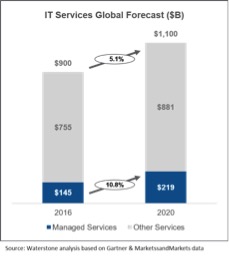 Increased interest in Managed Services—the proactive management of a technology product by the vendor on behalf of their customer as well as the offering of outsourced services related to and/or adjacent to the vendor’s products—is being driven by the continued shift to the cloud and as-a-service models, and a tendency among successful companies to focus on their core expertise while outsourcing ancillary services to third party experts. In addition to providing an opportunity for cost savings and operational improvements for the companies sourcing managed services, this growing interest also provides tech companies with an important opportunity for revenue generation.
Increased interest in Managed Services—the proactive management of a technology product by the vendor on behalf of their customer as well as the offering of outsourced services related to and/or adjacent to the vendor’s products—is being driven by the continued shift to the cloud and as-a-service models, and a tendency among successful companies to focus on their core expertise while outsourcing ancillary services to third party experts. In addition to providing an opportunity for cost savings and operational improvements for the companies sourcing managed services, this growing interest also provides tech companies with an important opportunity for revenue generation.
Three factors are driving technology providers to expand their offerings to include Managed Services:
Factor 1: The Financial Opportunity
In the face of the burgeoning interest in cloud-based and as-a-service offerings, growth in traditional services is slowing. Managed Services, on the other hand, have a more attractive trajectory. Between now and 2020, the overall IT services market is expected to grow at 5.1 percent annually, while the Managed Services segment is projected to grow at 10.8 percent annually over the same period. This equates to an expected market share jump from 16.1 percent today to 19.9 percent in 2020.
 Not only is the projected growth of Managed Services strong, gross margins can be 30 percent or greater, and they often carry a lower asset/investment base than the core product business, making this a major contributor to overall profits.
Not only is the projected growth of Managed Services strong, gross margins can be 30 percent or greater, and they often carry a lower asset/investment base than the core product business, making this a major contributor to overall profits.
Factor 2: Increasing Customer Demand
Demand for Managed Services and as-a-service offerings is growing, and more executives are not only increasingly aware of these offerings, but are more willing to pay for them than before. Common objections to as-a-service offerings are more readily overcome, also leading to an increase in demand. The perception that as-a-service is less secure is rapidly diminishing as more executives realize that, in most cases, sourcing a service from a cloud provider is exponentially more secure due to the technologies and rigorous protocols leading service providers have in place to address customer security expectations. With this increased demand, offering Managed Services is no longer an “extra,” but an offering that must become part of the portfolio simply to avoid losing business to competitors.
Factor 3: Stepping Stone to XaaS
The shift towards XaaS is undeniable, and some industry reports show XaaS growing at a minimum of 20 percent annually. The benefits to technology buyers—operational flexibility, the conversion of CAPEX to OPEX, and the ability to enjoy a higher level of service without the burden of in-house management—are certainly attractive. For technology providers, XaaS can provide predictable, long-term recurring revenues (though the front-loaded fees associated with traditional product and license sales are notably reduced or eliminated).
For born-in-the-cloud companies, the benefits are immediate, but for others, the shift takes time and can be painful operationally. Offering a Managed Services portfolio can serve as an important stepping stone to an as-a-service model.
Given these three factors, it is not surprising that many technology companies are turning to Managed Services, not only as a means to boost their services revenue and profit, but as an essential part of long-term survival in a cloud-driven world. To be successful, they must carefully select the services to offer as well as ensure that their operating model is properly aligned to effectively deliver these services. To learn more about the importance of the Managed Services opportunity and the MS operating model, check out my paper How to Succeed With Managed Services.
Eric Pelander is managing director and co-founder of Waterstone Management Group, an expert-led boutique management consulting firm focused on the information technology industry. Eric’s work with clients has focused on growth strategy and execution, including go-to-market and services improvements. Contact Eric at epelander@waterstonegroup.com, and follow him on LinkedIn and Twitter.
